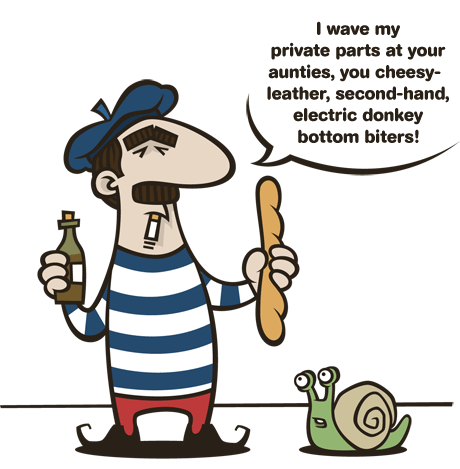ITEM 1: Picture
-
Type of bias: Stereotype
-
Analysis: A typical Frenchman image has his
appearance like the cartoon: wears a beret, striped shirt, eats baguette,
smokes cigar, and dinks wine... These are all fixed images that many people
have about Frenchmen but in reality it is not true.
Item 2: The 1936 Literary Digest Poll
The
Literary Digest was one of the most respected magazines of the time and
had a history of accurately predicting the winners of presidential elections
that dated back to 1916. For the presidential election of 1936 between Alfred
Landon, the Republican governor of Kansas and the incumbent President, Franklin
D. Roosevelt, the Literary Digest prediction was that Landon would get 57%
of the vote against Roosevelt's 43%. The Literary Digest's method for choosing
its sample was as follows: Based on every telephone directory in the United
States, lists of magazine subscribers, rosters of clubs and associations, and
other sources. A mailing list of about 10 million names was created. Every name
on this list was mailed a mock ballot and asked to return the marked ballot to
the magazine. However, the actual results of the election were 62% for
Roosevelt against 38% for Landon.
-
Type of bias: Assumption
-
Analysis:The major problem with the poll was
in the selection process for the names on the mailing list, which were taken
from telephone directories, club membership lists, lists of magazine
subscribers, etc. Such a list often consisted of middle- and upper-class
voters, and excluded lower-income voters. In 1936, telephones were much more of
a luxury than they are today. Furthermore, at a time when there were still 9
million people unemployed, the names of a significant segment of the population
would not show up on lists of club memberships and magazine subscribers. At
least with regard to economic status, the Literary Digest mailing list was far
from being a representative cross-section of the population.
Item 3:
The first day I was told by my mother that I
will be coming to Italy, I was very delighted. I arrived in Italy on the 25th
of November 2005; it was like a dream come true.
The first few weeks were good and fun, until a
day when I and my family were going to the church. After we boarded a bus, I
sat down close to an Italian woman. It seems at first she was very calm, although
she had some look on me. Then some minutes later she jumped up and started
grumbling in a high tone. I thought she was telling the driver to stop or
perhaps the driver must have taken her past her place of stop. I felt concern
and was trying to calm her down.
But when I tried to talking to her about what
was wrong even when she might not understand my English Language, she started
talking in a loud voice saying “I don’t like black” which she spoke in Italian
language. That was later interpreted to me. Everyone in the bus was looking at
me as if I had done something wrong to her. I was embarrassed. Even my mother
tried speaking to her, but she never stopped. It was at the next stop the Bus
ticket controllers came into the bus, so they met the scene and wanted to know
what happened. So I narrated to them in English. I was so glad they spoke in
English, even though not perfect.
After the conversation, it was then some
passenger in the bus got the real story and they were amazed, so the matter was
settled and she was ordered to go and sit elsewhere in the bus. Soon the bus
stop, she got off still talking. Then, I sat down thinking what have I done
wrong. But down inside me, I was hurt, then I said to myself is it because I am“black”, tears began running down my cheeks. It was when my
mum noticed me crying she came petting me.
-
Type of bias:
Discrimination
-
Analysis:In
this story, the discrimination is based on race. In other word, it is racial discrimination
and the little child is the typical victim. Maybe the journey would have been
wonderful if there had had no the Italian women’ behavior. She looked on
the child, jumped up and grumbled in a high tone and finally said “I don’t like
black” These women badly treated the child just because he is a black person.
Clearly, this women’s attitude was discriminating against the Black. More
seriously, it hurt the little boy’s soul.

thank you for your entry, it is good because of the variety and the good choices.
Trả lờiXóa